LB5241: Reflective Report on Leadership Management Practices
VerifiedAdded on 2023/01/20
|13
|2684
|42
Report
AI Summary
This report delves into the multifaceted realm of leadership management, providing a comprehensive analysis of leadership styles and their practical application within organizational contexts. It begins with an executive summary, followed by an introduction that distinguishes between leadership and management roles. The report emphasizes the importance of understanding the roles and responsibilities of leaders and managers. It explores how leadership studies can inform management skills, highlighting the significance of seeking feedback, critical thinking, and time management. The report details practical leadership strategies, including effective communication, conflict resolution, delegation of duties, and reward systems to motivate employees. The author emphasizes the value of time management and the importance of encouraging diverse opinions and information sourcing. The report concludes by summarizing the key takeaways and reinforcing the need for leaders to understand the dynamics of human resource management to achieve organizational goals. The report is based on the provided assignment brief from James Cook University, focusing on critical leadership studies and reflective practice.
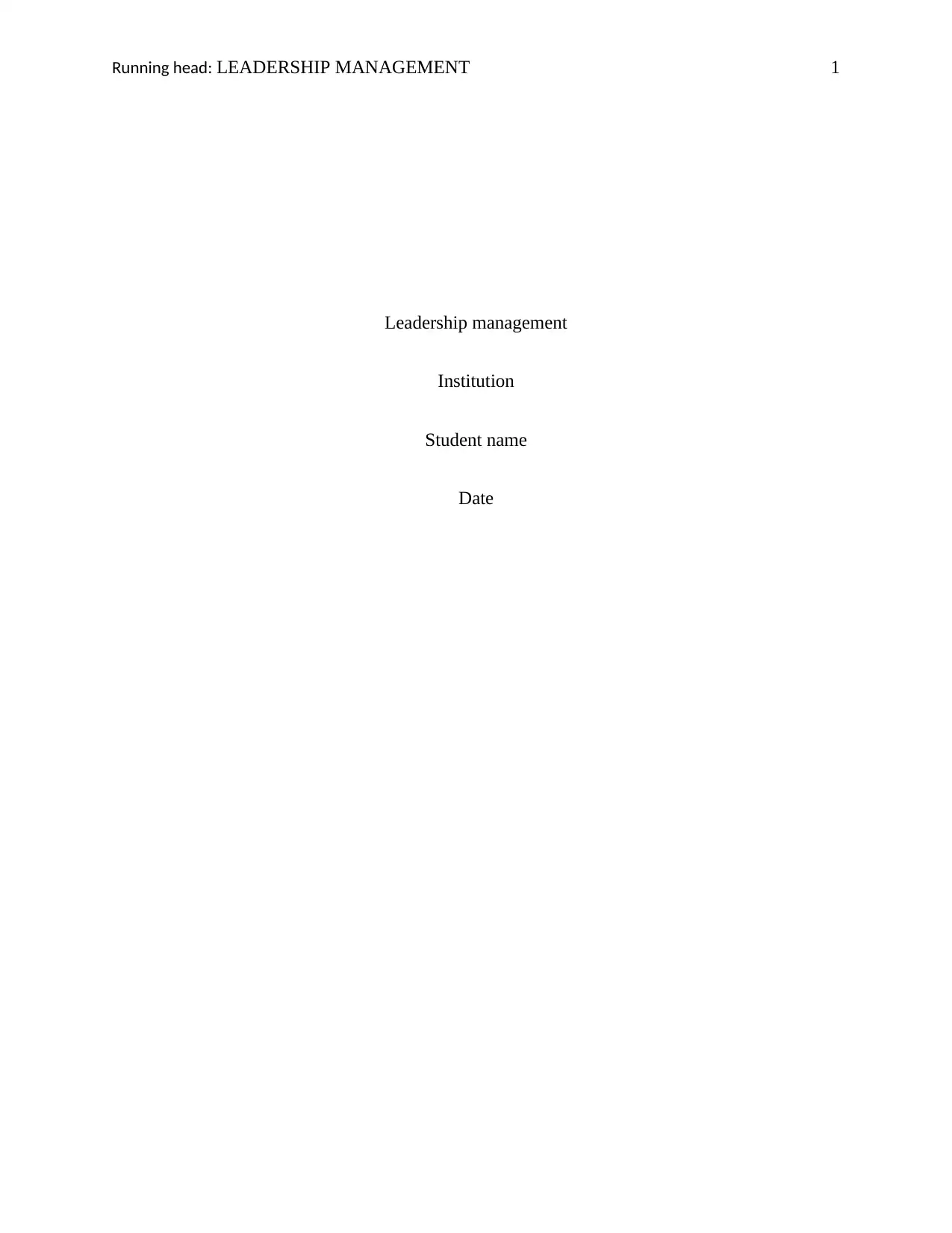
Running head: LEADERSHIP MANAGEMENT 1
Leadership management
Institution
Student name
Date
Leadership management
Institution
Student name
Date
Paraphrase This Document
Need a fresh take? Get an instant paraphrase of this document with our AI Paraphraser
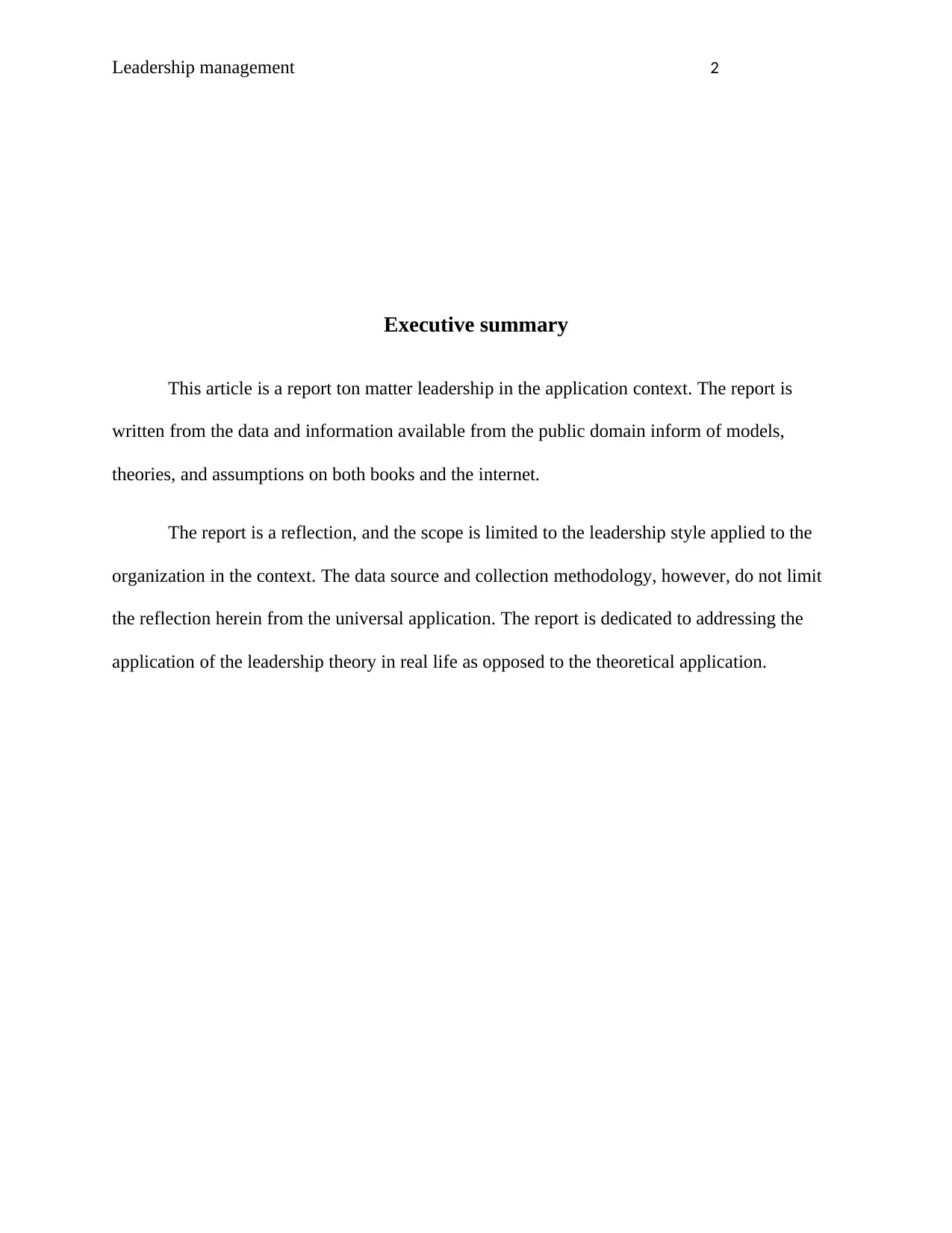
Leadership management 2
Executive summary
This article is a report ton matter leadership in the application context. The report is
written from the data and information available from the public domain inform of models,
theories, and assumptions on both books and the internet.
The report is a reflection, and the scope is limited to the leadership style applied to the
organization in the context. The data source and collection methodology, however, do not limit
the reflection herein from the universal application. The report is dedicated to addressing the
application of the leadership theory in real life as opposed to the theoretical application.
Executive summary
This article is a report ton matter leadership in the application context. The report is
written from the data and information available from the public domain inform of models,
theories, and assumptions on both books and the internet.
The report is a reflection, and the scope is limited to the leadership style applied to the
organization in the context. The data source and collection methodology, however, do not limit
the reflection herein from the universal application. The report is dedicated to addressing the
application of the leadership theory in real life as opposed to the theoretical application.
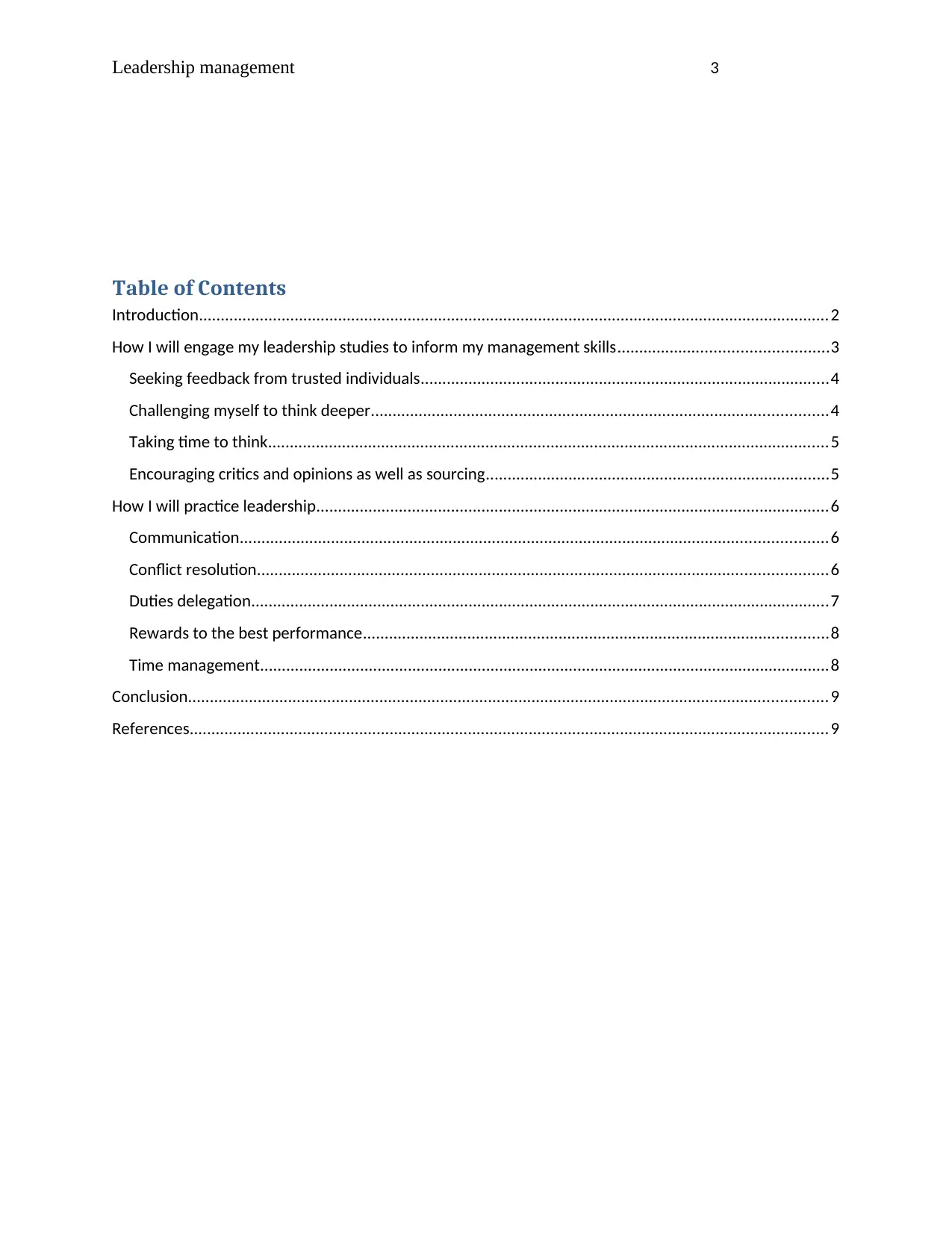
Leadership management 3
Table of Contents
Introduction.................................................................................................................................................2
How I will engage my leadership studies to inform my management skills................................................3
Seeking feedback from trusted individuals..............................................................................................4
Challenging myself to think deeper.........................................................................................................4
Taking time to think.................................................................................................................................5
Encouraging critics and opinions as well as sourcing...............................................................................5
How I will practice leadership......................................................................................................................6
Communication.......................................................................................................................................6
Conflict resolution...................................................................................................................................6
Duties delegation.....................................................................................................................................7
Rewards to the best performance...........................................................................................................8
Time management...................................................................................................................................8
Conclusion...................................................................................................................................................9
References...................................................................................................................................................9
Table of Contents
Introduction.................................................................................................................................................2
How I will engage my leadership studies to inform my management skills................................................3
Seeking feedback from trusted individuals..............................................................................................4
Challenging myself to think deeper.........................................................................................................4
Taking time to think.................................................................................................................................5
Encouraging critics and opinions as well as sourcing...............................................................................5
How I will practice leadership......................................................................................................................6
Communication.......................................................................................................................................6
Conflict resolution...................................................................................................................................6
Duties delegation.....................................................................................................................................7
Rewards to the best performance...........................................................................................................8
Time management...................................................................................................................................8
Conclusion...................................................................................................................................................9
References...................................................................................................................................................9
⊘ This is a preview!⊘
Do you want full access?
Subscribe today to unlock all pages.

Trusted by 1+ million students worldwide
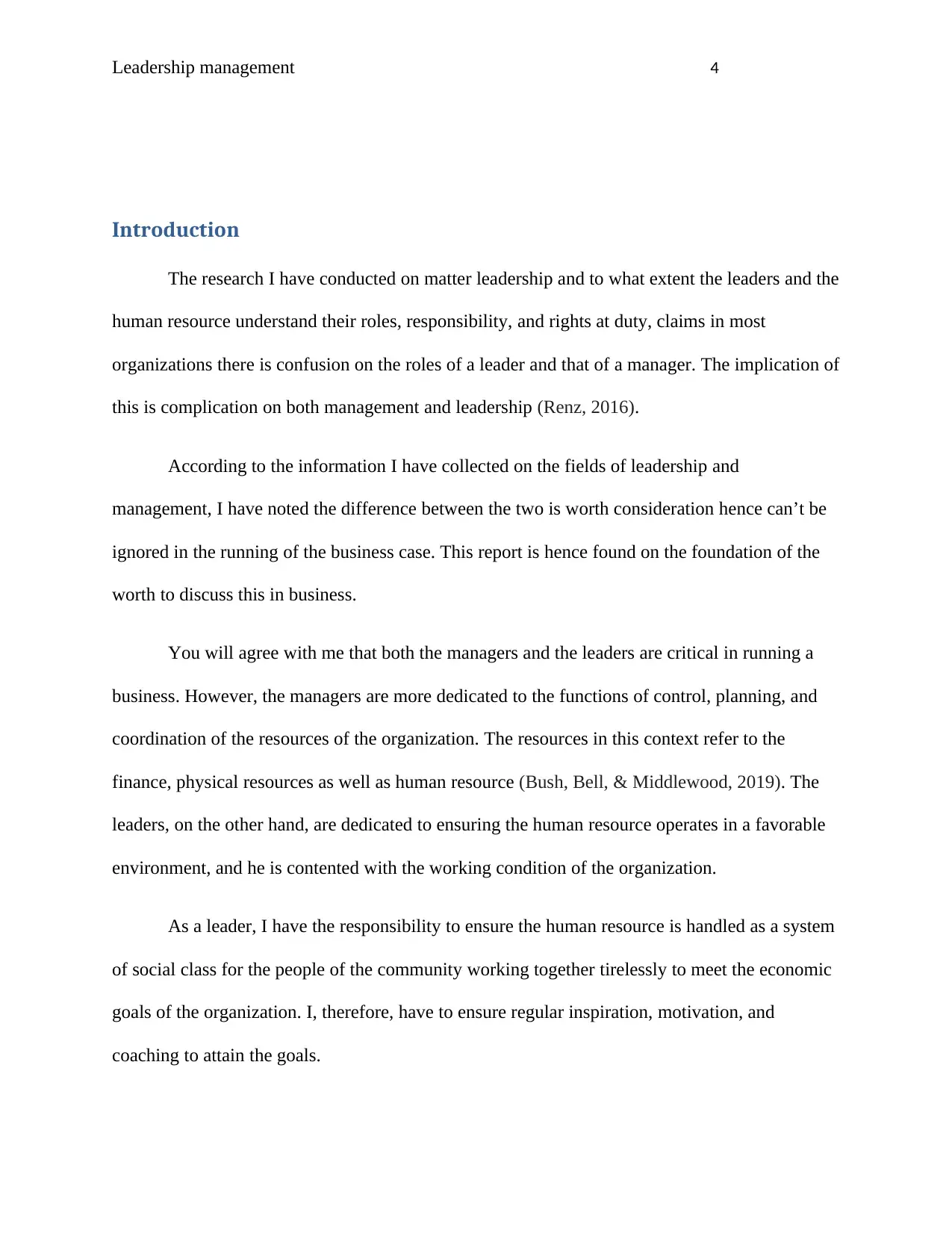
Leadership management 4
Introduction
The research I have conducted on matter leadership and to what extent the leaders and the
human resource understand their roles, responsibility, and rights at duty, claims in most
organizations there is confusion on the roles of a leader and that of a manager. The implication of
this is complication on both management and leadership (Renz, 2016).
According to the information I have collected on the fields of leadership and
management, I have noted the difference between the two is worth consideration hence can’t be
ignored in the running of the business case. This report is hence found on the foundation of the
worth to discuss this in business.
You will agree with me that both the managers and the leaders are critical in running a
business. However, the managers are more dedicated to the functions of control, planning, and
coordination of the resources of the organization. The resources in this context refer to the
finance, physical resources as well as human resource (Bush, Bell, & Middlewood, 2019). The
leaders, on the other hand, are dedicated to ensuring the human resource operates in a favorable
environment, and he is contented with the working condition of the organization.
As a leader, I have the responsibility to ensure the human resource is handled as a system
of social class for the people of the community working together tirelessly to meet the economic
goals of the organization. I, therefore, have to ensure regular inspiration, motivation, and
coaching to attain the goals.
Introduction
The research I have conducted on matter leadership and to what extent the leaders and the
human resource understand their roles, responsibility, and rights at duty, claims in most
organizations there is confusion on the roles of a leader and that of a manager. The implication of
this is complication on both management and leadership (Renz, 2016).
According to the information I have collected on the fields of leadership and
management, I have noted the difference between the two is worth consideration hence can’t be
ignored in the running of the business case. This report is hence found on the foundation of the
worth to discuss this in business.
You will agree with me that both the managers and the leaders are critical in running a
business. However, the managers are more dedicated to the functions of control, planning, and
coordination of the resources of the organization. The resources in this context refer to the
finance, physical resources as well as human resource (Bush, Bell, & Middlewood, 2019). The
leaders, on the other hand, are dedicated to ensuring the human resource operates in a favorable
environment, and he is contented with the working condition of the organization.
As a leader, I have the responsibility to ensure the human resource is handled as a system
of social class for the people of the community working together tirelessly to meet the economic
goals of the organization. I, therefore, have to ensure regular inspiration, motivation, and
coaching to attain the goals.
Paraphrase This Document
Need a fresh take? Get an instant paraphrase of this document with our AI Paraphraser
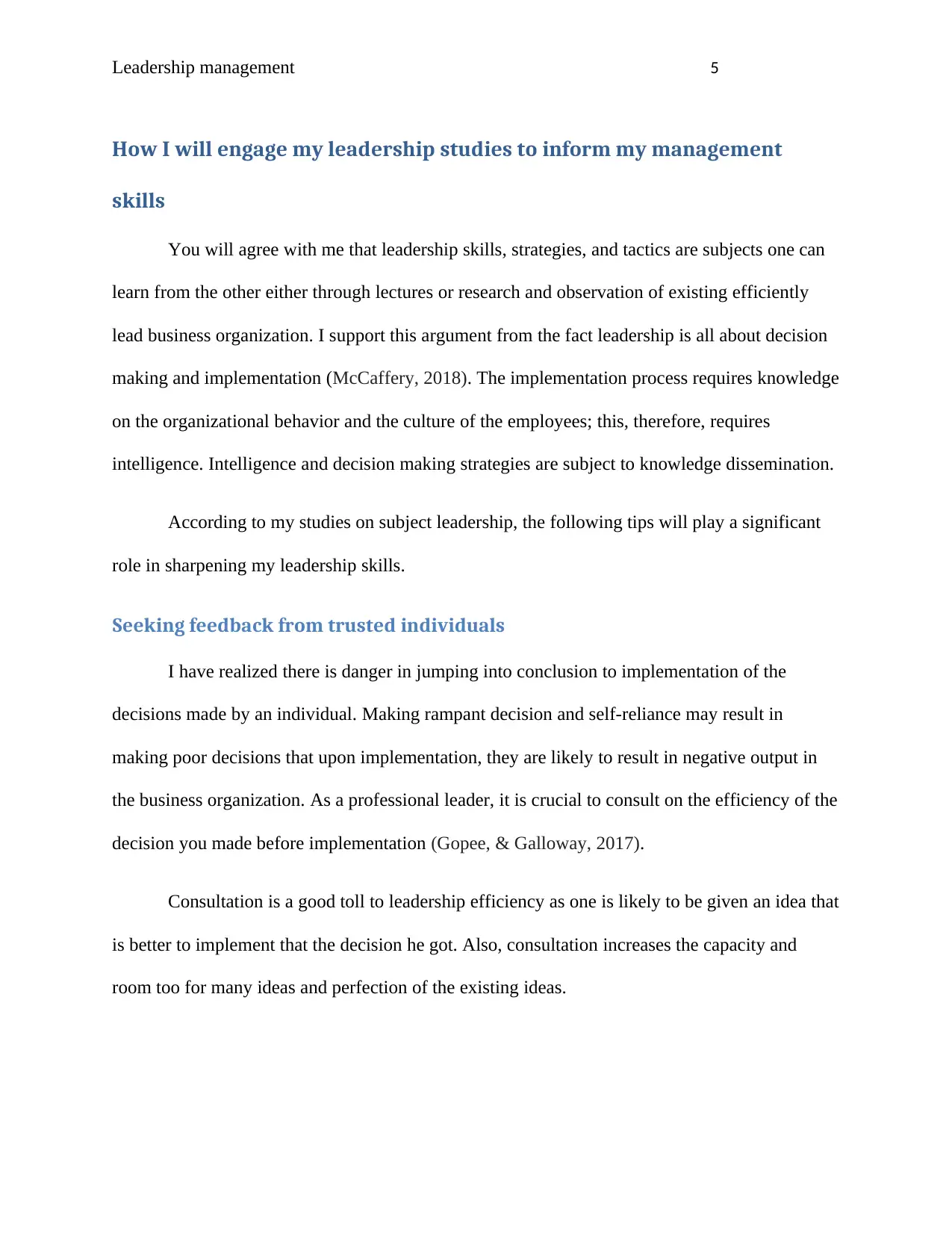
Leadership management 5
How I will engage my leadership studies to inform my management
skills
You will agree with me that leadership skills, strategies, and tactics are subjects one can
learn from the other either through lectures or research and observation of existing efficiently
lead business organization. I support this argument from the fact leadership is all about decision
making and implementation (McCaffery, 2018). The implementation process requires knowledge
on the organizational behavior and the culture of the employees; this, therefore, requires
intelligence. Intelligence and decision making strategies are subject to knowledge dissemination.
According to my studies on subject leadership, the following tips will play a significant
role in sharpening my leadership skills.
Seeking feedback from trusted individuals
I have realized there is danger in jumping into conclusion to implementation of the
decisions made by an individual. Making rampant decision and self-reliance may result in
making poor decisions that upon implementation, they are likely to result in negative output in
the business organization. As a professional leader, it is crucial to consult on the efficiency of the
decision you made before implementation (Gopee, & Galloway, 2017).
Consultation is a good toll to leadership efficiency as one is likely to be given an idea that
is better to implement that the decision he got. Also, consultation increases the capacity and
room too for many ideas and perfection of the existing ideas.
How I will engage my leadership studies to inform my management
skills
You will agree with me that leadership skills, strategies, and tactics are subjects one can
learn from the other either through lectures or research and observation of existing efficiently
lead business organization. I support this argument from the fact leadership is all about decision
making and implementation (McCaffery, 2018). The implementation process requires knowledge
on the organizational behavior and the culture of the employees; this, therefore, requires
intelligence. Intelligence and decision making strategies are subject to knowledge dissemination.
According to my studies on subject leadership, the following tips will play a significant
role in sharpening my leadership skills.
Seeking feedback from trusted individuals
I have realized there is danger in jumping into conclusion to implementation of the
decisions made by an individual. Making rampant decision and self-reliance may result in
making poor decisions that upon implementation, they are likely to result in negative output in
the business organization. As a professional leader, it is crucial to consult on the efficiency of the
decision you made before implementation (Gopee, & Galloway, 2017).
Consultation is a good toll to leadership efficiency as one is likely to be given an idea that
is better to implement that the decision he got. Also, consultation increases the capacity and
room too for many ideas and perfection of the existing ideas.
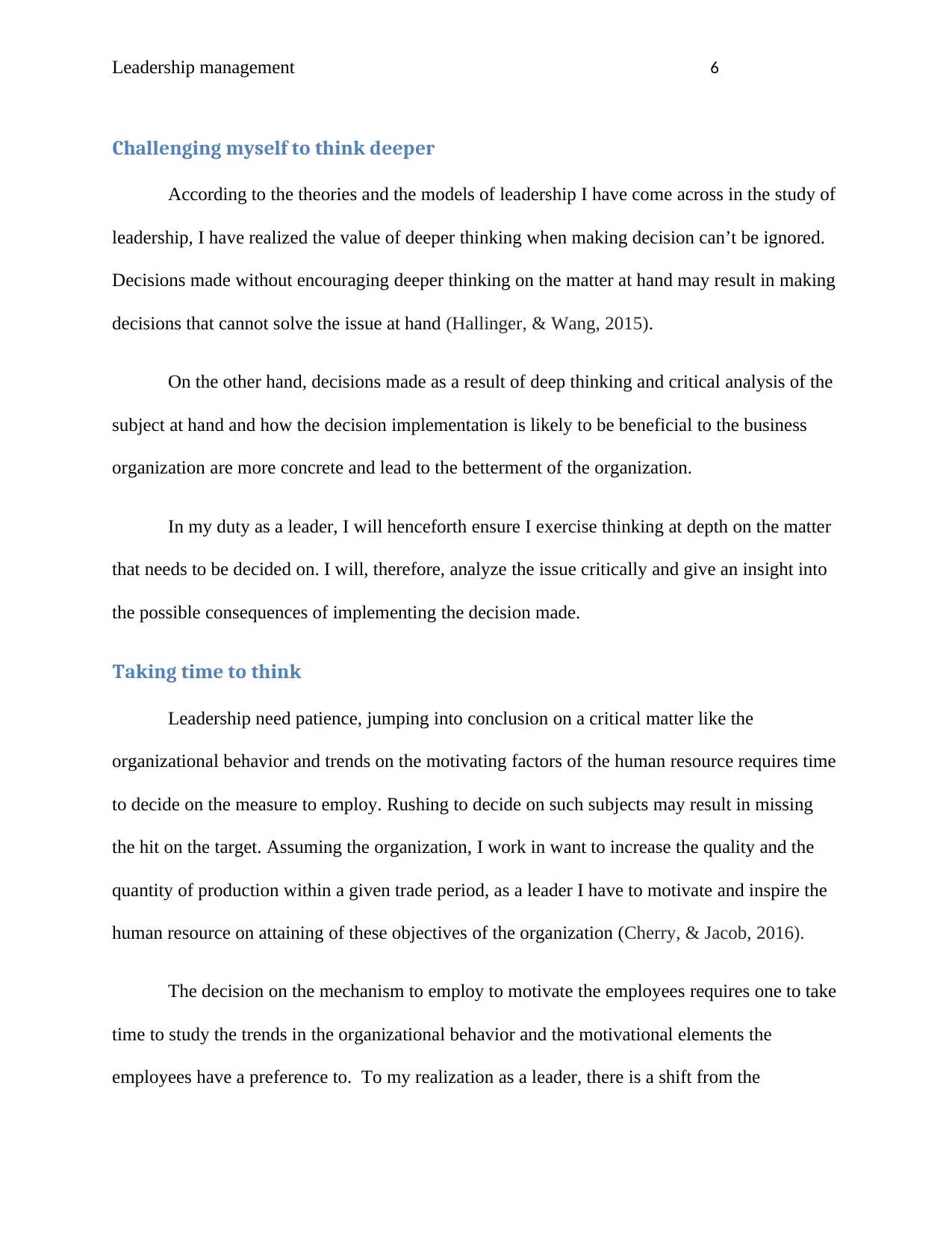
Leadership management 6
Challenging myself to think deeper
According to the theories and the models of leadership I have come across in the study of
leadership, I have realized the value of deeper thinking when making decision can’t be ignored.
Decisions made without encouraging deeper thinking on the matter at hand may result in making
decisions that cannot solve the issue at hand (Hallinger, & Wang, 2015).
On the other hand, decisions made as a result of deep thinking and critical analysis of the
subject at hand and how the decision implementation is likely to be beneficial to the business
organization are more concrete and lead to the betterment of the organization.
In my duty as a leader, I will henceforth ensure I exercise thinking at depth on the matter
that needs to be decided on. I will, therefore, analyze the issue critically and give an insight into
the possible consequences of implementing the decision made.
Taking time to think
Leadership need patience, jumping into conclusion on a critical matter like the
organizational behavior and trends on the motivating factors of the human resource requires time
to decide on the measure to employ. Rushing to decide on such subjects may result in missing
the hit on the target. Assuming the organization, I work in want to increase the quality and the
quantity of production within a given trade period, as a leader I have to motivate and inspire the
human resource on attaining of these objectives of the organization (Cherry, & Jacob, 2016).
The decision on the mechanism to employ to motivate the employees requires one to take
time to study the trends in the organizational behavior and the motivational elements the
employees have a preference to. To my realization as a leader, there is a shift from the
Challenging myself to think deeper
According to the theories and the models of leadership I have come across in the study of
leadership, I have realized the value of deeper thinking when making decision can’t be ignored.
Decisions made without encouraging deeper thinking on the matter at hand may result in making
decisions that cannot solve the issue at hand (Hallinger, & Wang, 2015).
On the other hand, decisions made as a result of deep thinking and critical analysis of the
subject at hand and how the decision implementation is likely to be beneficial to the business
organization are more concrete and lead to the betterment of the organization.
In my duty as a leader, I will henceforth ensure I exercise thinking at depth on the matter
that needs to be decided on. I will, therefore, analyze the issue critically and give an insight into
the possible consequences of implementing the decision made.
Taking time to think
Leadership need patience, jumping into conclusion on a critical matter like the
organizational behavior and trends on the motivating factors of the human resource requires time
to decide on the measure to employ. Rushing to decide on such subjects may result in missing
the hit on the target. Assuming the organization, I work in want to increase the quality and the
quantity of production within a given trade period, as a leader I have to motivate and inspire the
human resource on attaining of these objectives of the organization (Cherry, & Jacob, 2016).
The decision on the mechanism to employ to motivate the employees requires one to take
time to study the trends in the organizational behavior and the motivational elements the
employees have a preference to. To my realization as a leader, there is a shift from the
⊘ This is a preview!⊘
Do you want full access?
Subscribe today to unlock all pages.

Trusted by 1+ million students worldwide
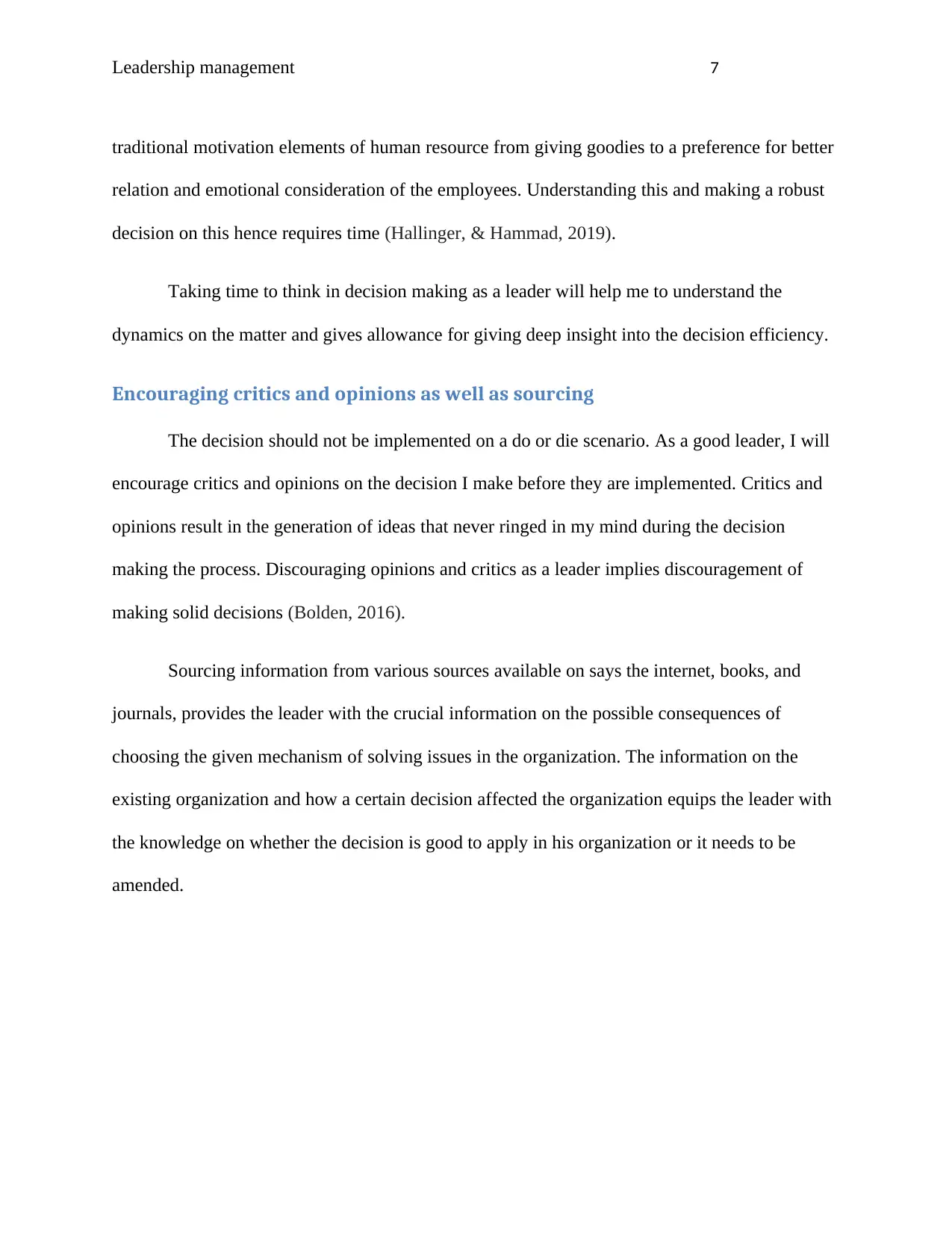
Leadership management 7
traditional motivation elements of human resource from giving goodies to a preference for better
relation and emotional consideration of the employees. Understanding this and making a robust
decision on this hence requires time (Hallinger, & Hammad, 2019).
Taking time to think in decision making as a leader will help me to understand the
dynamics on the matter and gives allowance for giving deep insight into the decision efficiency.
Encouraging critics and opinions as well as sourcing
The decision should not be implemented on a do or die scenario. As a good leader, I will
encourage critics and opinions on the decision I make before they are implemented. Critics and
opinions result in the generation of ideas that never ringed in my mind during the decision
making the process. Discouraging opinions and critics as a leader implies discouragement of
making solid decisions (Bolden, 2016).
Sourcing information from various sources available on says the internet, books, and
journals, provides the leader with the crucial information on the possible consequences of
choosing the given mechanism of solving issues in the organization. The information on the
existing organization and how a certain decision affected the organization equips the leader with
the knowledge on whether the decision is good to apply in his organization or it needs to be
amended.
traditional motivation elements of human resource from giving goodies to a preference for better
relation and emotional consideration of the employees. Understanding this and making a robust
decision on this hence requires time (Hallinger, & Hammad, 2019).
Taking time to think in decision making as a leader will help me to understand the
dynamics on the matter and gives allowance for giving deep insight into the decision efficiency.
Encouraging critics and opinions as well as sourcing
The decision should not be implemented on a do or die scenario. As a good leader, I will
encourage critics and opinions on the decision I make before they are implemented. Critics and
opinions result in the generation of ideas that never ringed in my mind during the decision
making the process. Discouraging opinions and critics as a leader implies discouragement of
making solid decisions (Bolden, 2016).
Sourcing information from various sources available on says the internet, books, and
journals, provides the leader with the crucial information on the possible consequences of
choosing the given mechanism of solving issues in the organization. The information on the
existing organization and how a certain decision affected the organization equips the leader with
the knowledge on whether the decision is good to apply in his organization or it needs to be
amended.
Paraphrase This Document
Need a fresh take? Get an instant paraphrase of this document with our AI Paraphraser
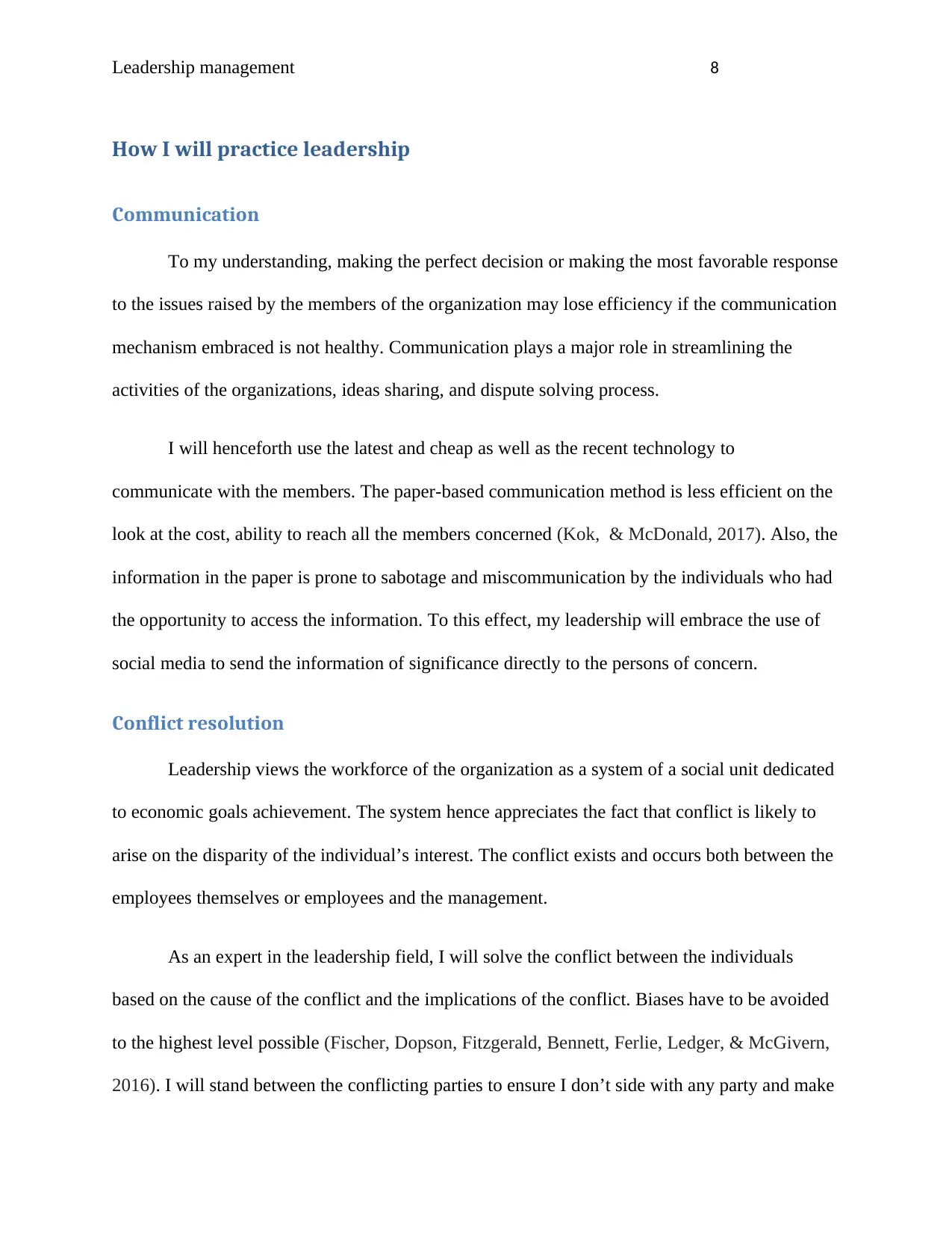
Leadership management 8
How I will practice leadership
Communication
To my understanding, making the perfect decision or making the most favorable response
to the issues raised by the members of the organization may lose efficiency if the communication
mechanism embraced is not healthy. Communication plays a major role in streamlining the
activities of the organizations, ideas sharing, and dispute solving process.
I will henceforth use the latest and cheap as well as the recent technology to
communicate with the members. The paper-based communication method is less efficient on the
look at the cost, ability to reach all the members concerned (Kok, & McDonald, 2017). Also, the
information in the paper is prone to sabotage and miscommunication by the individuals who had
the opportunity to access the information. To this effect, my leadership will embrace the use of
social media to send the information of significance directly to the persons of concern.
Conflict resolution
Leadership views the workforce of the organization as a system of a social unit dedicated
to economic goals achievement. The system hence appreciates the fact that conflict is likely to
arise on the disparity of the individual’s interest. The conflict exists and occurs both between the
employees themselves or employees and the management.
As an expert in the leadership field, I will solve the conflict between the individuals
based on the cause of the conflict and the implications of the conflict. Biases have to be avoided
to the highest level possible (Fischer, Dopson, Fitzgerald, Bennett, Ferlie, Ledger, & McGivern,
2016). I will stand between the conflicting parties to ensure I don’t side with any party and make
How I will practice leadership
Communication
To my understanding, making the perfect decision or making the most favorable response
to the issues raised by the members of the organization may lose efficiency if the communication
mechanism embraced is not healthy. Communication plays a major role in streamlining the
activities of the organizations, ideas sharing, and dispute solving process.
I will henceforth use the latest and cheap as well as the recent technology to
communicate with the members. The paper-based communication method is less efficient on the
look at the cost, ability to reach all the members concerned (Kok, & McDonald, 2017). Also, the
information in the paper is prone to sabotage and miscommunication by the individuals who had
the opportunity to access the information. To this effect, my leadership will embrace the use of
social media to send the information of significance directly to the persons of concern.
Conflict resolution
Leadership views the workforce of the organization as a system of a social unit dedicated
to economic goals achievement. The system hence appreciates the fact that conflict is likely to
arise on the disparity of the individual’s interest. The conflict exists and occurs both between the
employees themselves or employees and the management.
As an expert in the leadership field, I will solve the conflict between the individuals
based on the cause of the conflict and the implications of the conflict. Biases have to be avoided
to the highest level possible (Fischer, Dopson, Fitzgerald, Bennett, Ferlie, Ledger, & McGivern,
2016). I will stand between the conflicting parties to ensure I don’t side with any party and make
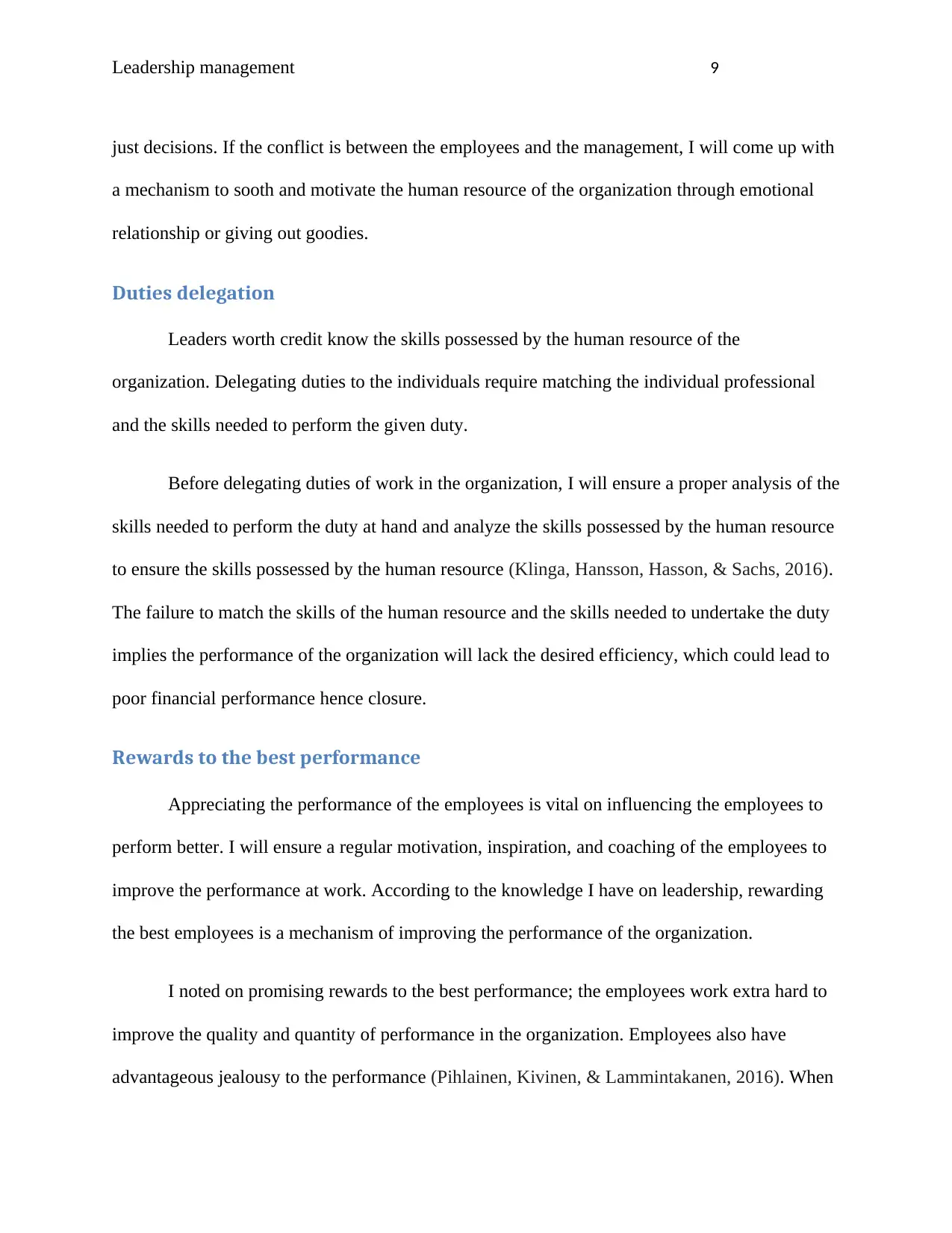
Leadership management 9
just decisions. If the conflict is between the employees and the management, I will come up with
a mechanism to sooth and motivate the human resource of the organization through emotional
relationship or giving out goodies.
Duties delegation
Leaders worth credit know the skills possessed by the human resource of the
organization. Delegating duties to the individuals require matching the individual professional
and the skills needed to perform the given duty.
Before delegating duties of work in the organization, I will ensure a proper analysis of the
skills needed to perform the duty at hand and analyze the skills possessed by the human resource
to ensure the skills possessed by the human resource (Klinga, Hansson, Hasson, & Sachs, 2016).
The failure to match the skills of the human resource and the skills needed to undertake the duty
implies the performance of the organization will lack the desired efficiency, which could lead to
poor financial performance hence closure.
Rewards to the best performance
Appreciating the performance of the employees is vital on influencing the employees to
perform better. I will ensure a regular motivation, inspiration, and coaching of the employees to
improve the performance at work. According to the knowledge I have on leadership, rewarding
the best employees is a mechanism of improving the performance of the organization.
I noted on promising rewards to the best performance; the employees work extra hard to
improve the quality and quantity of performance in the organization. Employees also have
advantageous jealousy to the performance (Pihlainen, Kivinen, & Lammintakanen, 2016). When
just decisions. If the conflict is between the employees and the management, I will come up with
a mechanism to sooth and motivate the human resource of the organization through emotional
relationship or giving out goodies.
Duties delegation
Leaders worth credit know the skills possessed by the human resource of the
organization. Delegating duties to the individuals require matching the individual professional
and the skills needed to perform the given duty.
Before delegating duties of work in the organization, I will ensure a proper analysis of the
skills needed to perform the duty at hand and analyze the skills possessed by the human resource
to ensure the skills possessed by the human resource (Klinga, Hansson, Hasson, & Sachs, 2016).
The failure to match the skills of the human resource and the skills needed to undertake the duty
implies the performance of the organization will lack the desired efficiency, which could lead to
poor financial performance hence closure.
Rewards to the best performance
Appreciating the performance of the employees is vital on influencing the employees to
perform better. I will ensure a regular motivation, inspiration, and coaching of the employees to
improve the performance at work. According to the knowledge I have on leadership, rewarding
the best employees is a mechanism of improving the performance of the organization.
I noted on promising rewards to the best performance; the employees work extra hard to
improve the quality and quantity of performance in the organization. Employees also have
advantageous jealousy to the performance (Pihlainen, Kivinen, & Lammintakanen, 2016). When
⊘ This is a preview!⊘
Do you want full access?
Subscribe today to unlock all pages.

Trusted by 1+ million students worldwide
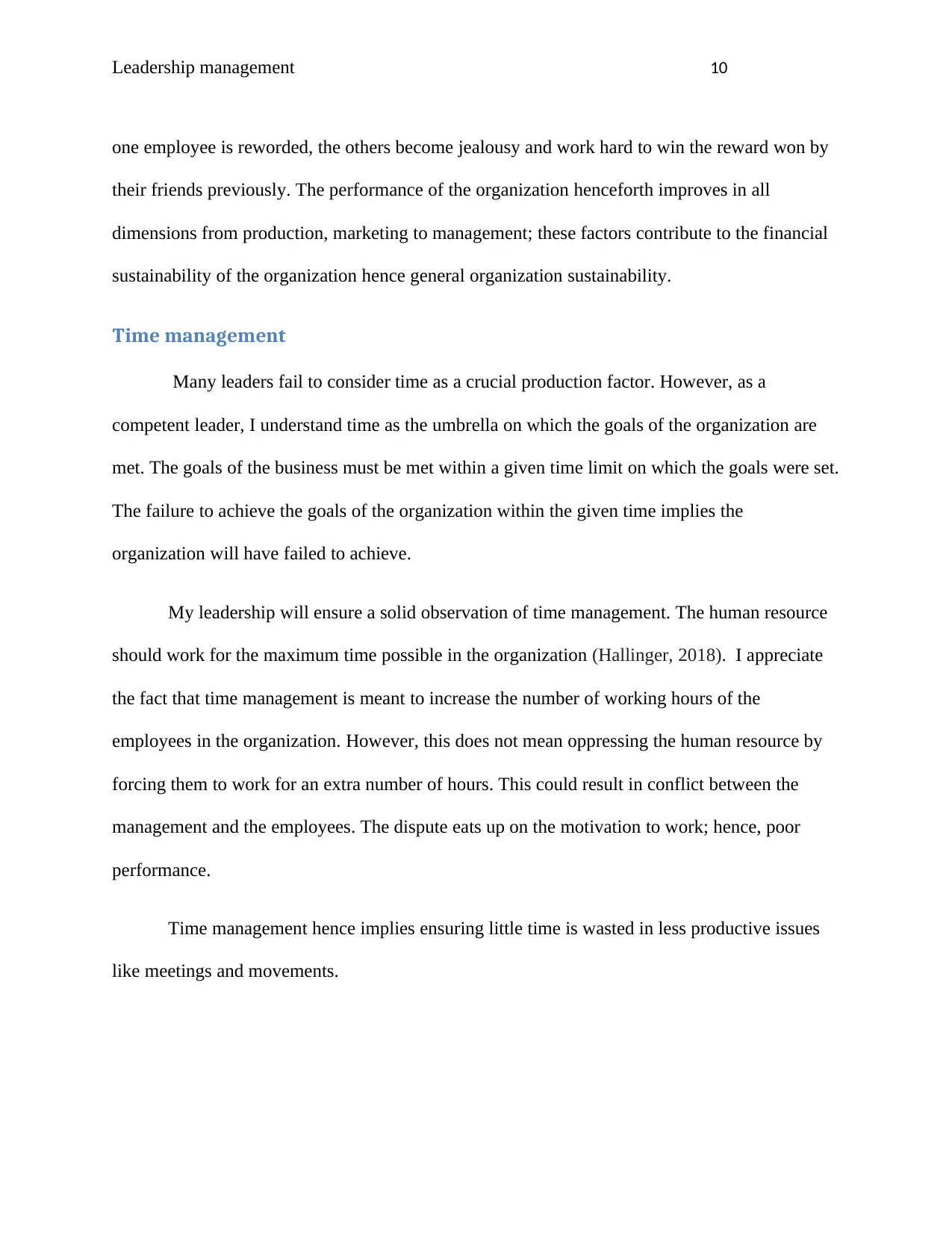
Leadership management 10
one employee is reworded, the others become jealousy and work hard to win the reward won by
their friends previously. The performance of the organization henceforth improves in all
dimensions from production, marketing to management; these factors contribute to the financial
sustainability of the organization hence general organization sustainability.
Time management
Many leaders fail to consider time as a crucial production factor. However, as a
competent leader, I understand time as the umbrella on which the goals of the organization are
met. The goals of the business must be met within a given time limit on which the goals were set.
The failure to achieve the goals of the organization within the given time implies the
organization will have failed to achieve.
My leadership will ensure a solid observation of time management. The human resource
should work for the maximum time possible in the organization (Hallinger, 2018). I appreciate
the fact that time management is meant to increase the number of working hours of the
employees in the organization. However, this does not mean oppressing the human resource by
forcing them to work for an extra number of hours. This could result in conflict between the
management and the employees. The dispute eats up on the motivation to work; hence, poor
performance.
Time management hence implies ensuring little time is wasted in less productive issues
like meetings and movements.
one employee is reworded, the others become jealousy and work hard to win the reward won by
their friends previously. The performance of the organization henceforth improves in all
dimensions from production, marketing to management; these factors contribute to the financial
sustainability of the organization hence general organization sustainability.
Time management
Many leaders fail to consider time as a crucial production factor. However, as a
competent leader, I understand time as the umbrella on which the goals of the organization are
met. The goals of the business must be met within a given time limit on which the goals were set.
The failure to achieve the goals of the organization within the given time implies the
organization will have failed to achieve.
My leadership will ensure a solid observation of time management. The human resource
should work for the maximum time possible in the organization (Hallinger, 2018). I appreciate
the fact that time management is meant to increase the number of working hours of the
employees in the organization. However, this does not mean oppressing the human resource by
forcing them to work for an extra number of hours. This could result in conflict between the
management and the employees. The dispute eats up on the motivation to work; hence, poor
performance.
Time management hence implies ensuring little time is wasted in less productive issues
like meetings and movements.
Paraphrase This Document
Need a fresh take? Get an instant paraphrase of this document with our AI Paraphraser
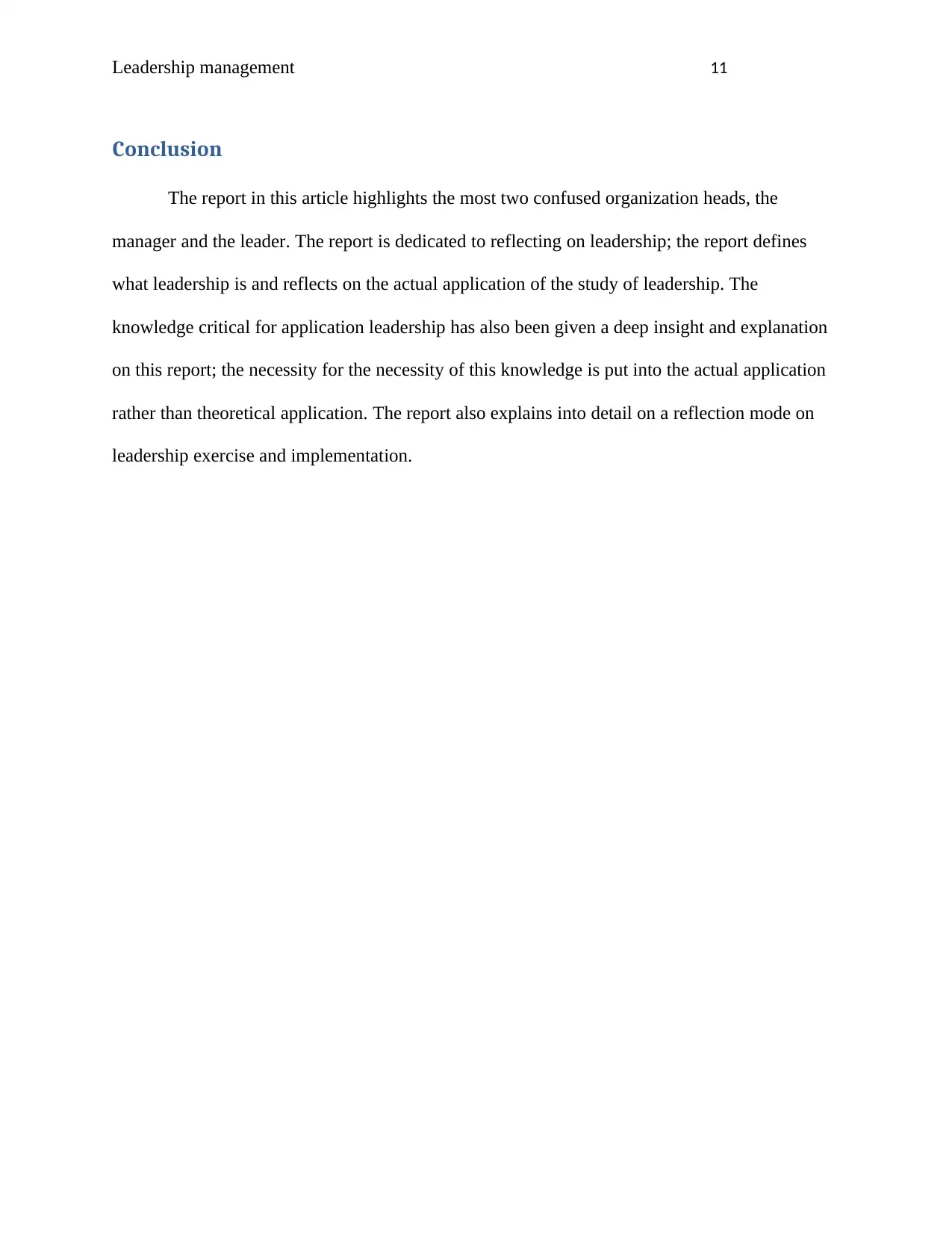
Leadership management 11
Conclusion
The report in this article highlights the most two confused organization heads, the
manager and the leader. The report is dedicated to reflecting on leadership; the report defines
what leadership is and reflects on the actual application of the study of leadership. The
knowledge critical for application leadership has also been given a deep insight and explanation
on this report; the necessity for the necessity of this knowledge is put into the actual application
rather than theoretical application. The report also explains into detail on a reflection mode on
leadership exercise and implementation.
Conclusion
The report in this article highlights the most two confused organization heads, the
manager and the leader. The report is dedicated to reflecting on leadership; the report defines
what leadership is and reflects on the actual application of the study of leadership. The
knowledge critical for application leadership has also been given a deep insight and explanation
on this report; the necessity for the necessity of this knowledge is put into the actual application
rather than theoretical application. The report also explains into detail on a reflection mode on
leadership exercise and implementation.
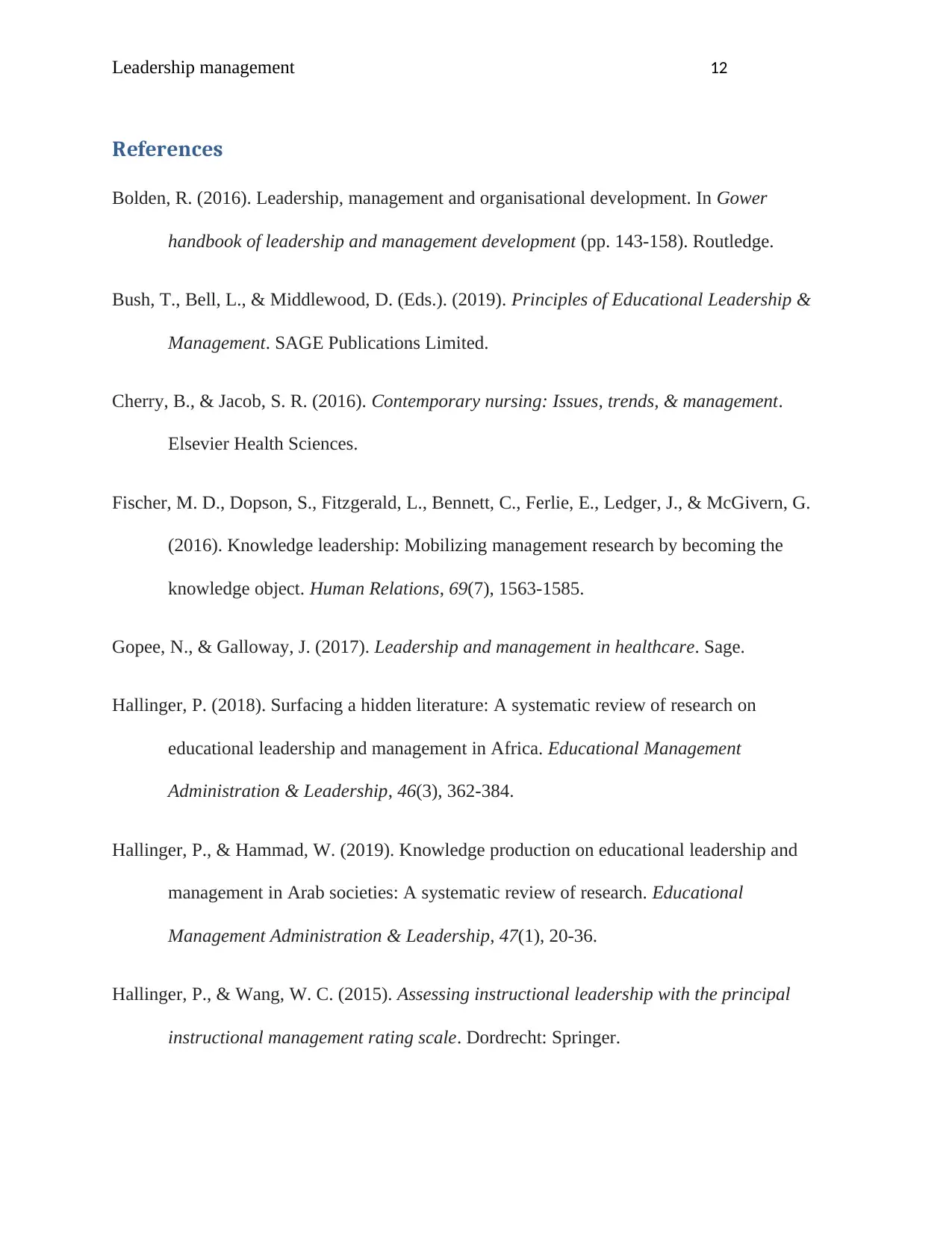
Leadership management 12
References
Bolden, R. (2016). Leadership, management and organisational development. In Gower
handbook of leadership and management development (pp. 143-158). Routledge.
Bush, T., Bell, L., & Middlewood, D. (Eds.). (2019). Principles of Educational Leadership &
Management. SAGE Publications Limited.
Cherry, B., & Jacob, S. R. (2016). Contemporary nursing: Issues, trends, & management.
Elsevier Health Sciences.
Fischer, M. D., Dopson, S., Fitzgerald, L., Bennett, C., Ferlie, E., Ledger, J., & McGivern, G.
(2016). Knowledge leadership: Mobilizing management research by becoming the
knowledge object. Human Relations, 69(7), 1563-1585.
Gopee, N., & Galloway, J. (2017). Leadership and management in healthcare. Sage.
Hallinger, P. (2018). Surfacing a hidden literature: A systematic review of research on
educational leadership and management in Africa. Educational Management
Administration & Leadership, 46(3), 362-384.
Hallinger, P., & Hammad, W. (2019). Knowledge production on educational leadership and
management in Arab societies: A systematic review of research. Educational
Management Administration & Leadership, 47(1), 20-36.
Hallinger, P., & Wang, W. C. (2015). Assessing instructional leadership with the principal
instructional management rating scale. Dordrecht: Springer.
References
Bolden, R. (2016). Leadership, management and organisational development. In Gower
handbook of leadership and management development (pp. 143-158). Routledge.
Bush, T., Bell, L., & Middlewood, D. (Eds.). (2019). Principles of Educational Leadership &
Management. SAGE Publications Limited.
Cherry, B., & Jacob, S. R. (2016). Contemporary nursing: Issues, trends, & management.
Elsevier Health Sciences.
Fischer, M. D., Dopson, S., Fitzgerald, L., Bennett, C., Ferlie, E., Ledger, J., & McGivern, G.
(2016). Knowledge leadership: Mobilizing management research by becoming the
knowledge object. Human Relations, 69(7), 1563-1585.
Gopee, N., & Galloway, J. (2017). Leadership and management in healthcare. Sage.
Hallinger, P. (2018). Surfacing a hidden literature: A systematic review of research on
educational leadership and management in Africa. Educational Management
Administration & Leadership, 46(3), 362-384.
Hallinger, P., & Hammad, W. (2019). Knowledge production on educational leadership and
management in Arab societies: A systematic review of research. Educational
Management Administration & Leadership, 47(1), 20-36.
Hallinger, P., & Wang, W. C. (2015). Assessing instructional leadership with the principal
instructional management rating scale. Dordrecht: Springer.
⊘ This is a preview!⊘
Do you want full access?
Subscribe today to unlock all pages.

Trusted by 1+ million students worldwide
1 out of 13
Related Documents
Your All-in-One AI-Powered Toolkit for Academic Success.
+13062052269
info@desklib.com
Available 24*7 on WhatsApp / Email
![[object Object]](/_next/static/media/star-bottom.7253800d.svg)
Unlock your academic potential
Copyright © 2020–2026 A2Z Services. All Rights Reserved. Developed and managed by ZUCOL.




